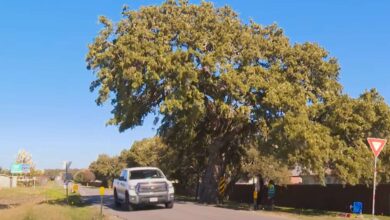America’s Most Dangerous Prisoners Are Being Rehabilitated by Novel College Program (Exclusive)
:max_bytes(150000):strip_icc():format(jpeg)/prison-education-program-092825-57244d20f66e490287b85a8a3245de95.jpg)
NEED TO KNOW
- The first-of-its kind bachelor program at one of the nation’s most notorious prisons is being offered — to those inmates who qualify — through Cal Poly Humboldt.
- Pelican Bay State Prison Warden Stephen Smith credits the program with helping to change the atmosphere at the supermax facility that houses some of the state’s most violent prisoners
- Student inmates like Salvador Jacobo insist that the program is giving him the critical thinking skills needed to better understand “why the hell I ended up the way I did”
Mark Taylor was eight years into his life sentence for a gang-related murder when, one afternoon in 2005, he says something like a miracle took place in his cell.
Together with the other inmates at California’s Ironwood State Prison, he’d been ordered back to his cell during a lockdown. Then he spotted a counselor from a local community college — which was offering classes to inmates — walk through his housing unit.
Taylor already knew about the program that enabled inmates to acquire associate degrees and had even mentioned it to his mother, Patricia Scarfone, during their phone conversations.
“Every time I would call her, she’d ask, ‘Are you in college yet?’ ” recalls Taylor, who’d convinced himself that he wasn’t “smart enough” to go to college. But on that afternoon as he stood in his cell, he thought about his mom and shouted out at the counselor: “Hey man, can I take a class?”
That moment wasn’t just a turning point in Taylor’s life — he ended up earning six associate degrees while maintaining a 4.0 GPA — it is now also helping to transform the lives of inmates at California’s notorious Pelican Bay State Prison, often described as housing “the worst of the worst.”
Once Taylor got paroled in 2018, after 21 years behind bars, he quickly went to work helping to create a novel higher education program through Cal Poly Humboldt that is allowing violent, hardened prisoners at Pelican Bay to earn four-year bachelor’s degrees and turn their lives around.
“Without education, I’d still be an alcoholic, drug-addicted, angry, violent street gang member — and in prison,” says Taylor, 54. He calls his work at Pelican Bay a way of “making amends” for the pain he caused so many people.
Tiffany Conover/Pelican Bay State Prison
“I want to see people come home healthy and whole and not hurt people. And I think college is one way to do that,” Taylor says.
If nothing else, Pelican Bay’s venture into higher education is sound economics, he says, noting that statistics show less than 3% of former inmates with bachelor’s degrees return to prison within three years of their release.
For those who haven’t earned a college degree, the national recidivism rate for that same three-year period is between 66 and 68%, according to the Council for Criminal Justice.
“Fiscally speaking,” adds Taylor, who now works with the Anti-Recidivism Coalition, “it just makes sense, especially when you consider that it costs approximately $132,000 to keep one person in prison for a year in California.”
Never miss a story — sign up for PEOPLE’s free daily newsletter to stay up-to-date on the best of what PEOPLE has to offer, from celebrity news to compelling human interest stories.
The educational program at Pelican Bay is the first of its kind ever implemented at a maximum-security prison in California and is helping to reduce recidivism rates while increasing employment opportunities for parolees, officials say.
Even more importantly, it provides inmates with the type of critical thinking skills that helps them better take accountability for their actions — and ultimately makes the prison safer.
“It’s just better for the prison, for the incarcerated and for the staff,” says Pelican Bay’s warden, Stephen Smith.
“So many incarcerated people feel like they’re lost and they have nothing to lose. But when they see that they can achieve something and they can be successful, their mindset starts changing bit by bit,” Smith says.
Pelican Bay State Prison
For Antonio Barajas — who dropped out of school in ninth grade and was convicted of murder in 2022 — the work in the classroom among inmates who once couldn’t be on the same basketball court but are now studying together is awe inspiring.
“I’ve seen a change in the whole institution here,” says Barajas, 40, who earned his GED and associate degree at the prison and has “fallen in love” with learning as an alternative where his life had been headed for years before.
“People are going to college now. They’re hitting the right path. It’s been nothing but positive,” he says.
The very idea that Pelican Bay — located in the remote northwest corner of California and opened in 1989 as one of the nation’s first so-called supermax prisons — would one day host a groundbreaking college program may seem far fetched.
Over the years, several of the state’s most notorious serial killers and gang leaders have been housed at the facility. Conditions there have also stirred controversy: A 2013 hunger strike staged by four alleged leaders of rival prison gangs protested the incarceration of inmates in solitary confinement for lengthy, often indefinite periods of time.
Two years later, the prison began offering two-year community college degrees through the College of the Redwoods.
Taylor’s new program, launched in April 2024, allows graduates of the earlier program to go on and earn a bachelor’s degree in communication. Much of the money for tuition comes from the Second Chance Pell Grant program. (Those funds are tentatively set to expire in the summer of 2026 due to an executive order signed by President Donald Trump earlier this year.)
Tiffany Conover/Pelican Bay State Prison
For inmates like Salvador Jacobo, who is serving a life sentence for a gang-related killing, the program, held in 900-square-foot classroom lined with computers, is helping him forge a fresh start of sorts after a life marred by trouble.
He often wakes up a four each morning to prepare for class and spends six hours a day on his schoolwork.
“I always want to go to class prepared and be able to discuss things,” Jacobo says, crediting the program for giving him “meaning.”
After graduating with bachelor’s degree, the former high school dropout is determined to one day find a way to earn another degree in psychology.
“It’s selfish,” Jacobo, 39, says, “but I want to understand why the hell I ended up the way I did, to understand why I was so susceptible to criminal thinking and all the things that ruined my life, my family’s life and the life of my victim.”
Tiffany Conover/Pelican Bay State Prison
Taylor’s program, which currently includes 28 students, has proven so popular that some inmates have declined to be transferred to less remote, lower security level prisons just so they can continue working toward their degrees.
“For many of these guys, Pelican Bay is so far away from their family that they go years without visits,” says Taylor. “But when they get the chance to go to a lower-level prison, they’re like, ‘No. Leave me here. This is where the education’s at.’ ”
For inmate Barajas — who hopes earn his bachelor degree before his parole hearing in late 2026 — the program makes sense in ways that go far beyond economics. It’s opening up a new world that, according to the Pelican Bay warden, is “spreading like a virus” throughout the prison.
Says Barajas: “The whole mood of this place has changed. You walk the yard now and guys are talking about their class assignments, what they learned and trying to encourage others to study. That never happened before. It’s weird, but it’s a good weird.”
Credit to Nypost AND Peoples



